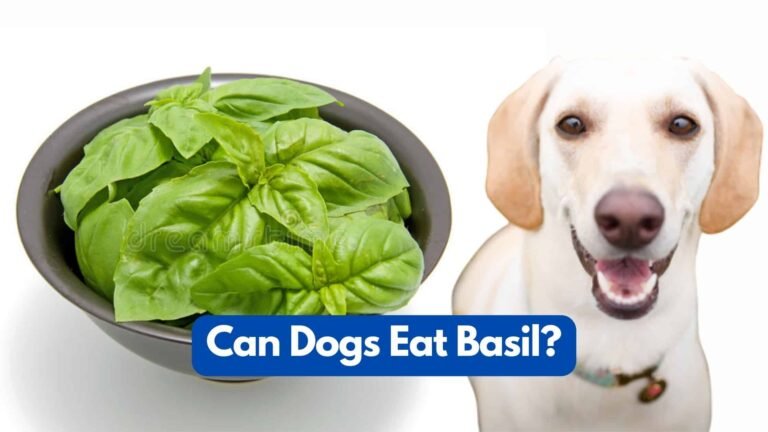Can Dogs Eat Eggplant? Facts From Experience

Eggplant, also known as aubergine, brinjal, or melanzana, is a popular vegetable that comes in various shapes, sizes, and colors.
It has a mild taste and a soft, creamy texture when cooked, making it a versatile ingredient in many cuisines. But can dogs eat eggplant? Is it safe and healthy for them? Or is it toxic and harmful?
In this article, we will answer these questions and more, so you can decide whether to share this purple plant with your furry friend.
Can Dogs Eat Eggplant?
The short answer is yes, eggplant is safe for dogs in moderation and as an occasional treat. Eggplant is not toxic to dogs and does not contain any harmful components that can harm them.
However, some dogs may be allergic to eggplant or have trouble digesting it, so you should always introduce it gradually and watch for any signs of adverse reactions.
Also, you should only feed your dog plain and cooked eggplant without any seasonings, or spices. It should not also contain sauces that may contain ingredients that are toxic to dogs, such as garlic, onion, salt, or chocolate.

Reasons Why Eggplant is Good For Your Dog
Eggplant is a nutritious vegetable that can provide a range of health benefits to your dog. Here are some of the reasons why eggplant is good for your dog:
- Nutritional Value: Eggplant is packed with essential vitamins and minerals such as potassium, magnesium, folate, and vitamins A and C. These nutrients can support your dog’s immune system, aid in muscle function, and promote healthy skin and fur.
- Antioxidants: Eggplant contains anthocyanins, which are powerful antioxidants that can help protect your dog’s cells against damage from free radicals.
- Fiber: This vegetable is rich in dietary fiber, which can aid in digestion and promote bowel regularity in your furry companion.
- Hydration: Eggplant has a high water content, which can contribute to your dog’s hydration levels and help keep them cool during hot weather.
Risks of Feeding Your Dog With Eggplant
While eggplant is generally safe for dogs to eat, there are still some risks associated with feeding your dog this fruit. Here are some of the potential risks you should be aware of:
- Allergic Reactions: While eggplant is not a common allergen for dogs, there is still a chance that your dog may be allergic to it.
- Digestive Issues: Eggplant contains solanine, which is a compound that can cause digestive issues in dogs if consumed in large amounts. To avoid these issues, make sure to feed your dog eggplant in moderation and in small amounts.
- Kidney Problems: Eggplant contains oxalates, which can cause kidney problems in dogs if consumed in large amounts. If your dog has a history of kidney problems, it’s best to avoid feeding them eggplant altogether.
- Arthritis: Eggplant also contains a substance called solasonine, which can aggravate arthritis in dogs. If your dog has arthritis, it’s best to avoid feeding them eggplant to prevent any further complications.
What Type of Eggplant Should You Feed Your Dog?
The best type of eggplant to feed your dog is the common, ripe, and mature variety. This type of eggplant has a higher nutritional value and a lower solanine content compared to unripe eggplants.
It’s also advisable to choose organic eggplants whenever possible, as they are less likely to contain harmful pesticides or chemicals.
Note that you can feed your dog both cooked and raw eggplant. So, ensure that you choose a fresh eggplant that is firm and free from any soft spots or bruises.

Can Dogs Have Eggplant With Egg?
Yes, dogs can have eggplant with egg. Combining these two ingredients can provide a protein-packed and nutritious snack for your four-legged friend.
However, it’s essential to prepare the eggs without added salt, spices, or any other potentially harmful seasonings.
Can Dogs Eat Green Eggplant?
No, dogs should not eat green eggplant. Unripe or green eggplants contain higher levels of solanine, which can be toxic to dogs.
Stick to feeding your dog mature and ripe eggplants to avoid any potential health issues.
Can Dogs Eat Eggplant Skin?
While the flesh of eggplant is safe for dogs, it’s best to remove the skin before feeding it to your furry friend.
The skin can be tough for dogs to digest and may cause gastrointestinal discomfort. Peeling the eggplant will ensure easier digestion and minimize the risk of any adverse reactions.
Can Dogs Eat Fried Eggplant?
Fried eggplant is not recommended for dogs. The frying process often involves the use of oils and breading, which can be detrimental to your dog’s health.
The added fats, spices, and high sodium content in fried eggplant can lead to digestive issues and potentially even pancreatitis in dogs.
Can Dogs Eat Raw Eggplant?
While some dogs may enjoy the taste and texture of raw eggplant, it’s generally safer to feed them cooked eggplant. Raw eggplant can be difficult for dogs to chew and digest, potentially leading to gastrointestinal distress, including stomach upset or bloating.
Cooking the eggplant makes it easier for your pup to digest and reduces the risk of any digestive problems.

How Can I Give My Dog Eggplant?
If you want to give your dog eggplant, there are a few things you need to keep in mind to ensure their safety and health. Here are some tips on how to give your dog eggplant:
1. Cook it thoroughly
Cooking eggplant thoroughly is essential to reduce your dog’s risks. Grilling, baking, or boiling this purple vegetable is much healthier than frying it. Complicated recipes are questionable for canines. If you’re giving your dog eggplant as a treat, make sure it’s cooked thoroughly and cut into small pieces.
2. Start with small amounts
It is recommended that you start by giving your dog small amounts of eggplant. This will help you monitor any adverse reactions your dog may have to the vegetable.
3. Watch for any allergic reactions
Although most dogs can safely eat eggplant, some dogs are allergic to it. When introducing eggplant to your dog’s diet, watch your dog carefully for any signs of allergic reactions, which can include itching, rashes, diarrhea, and stomach upsets.
4. Avoid giving eggplant to dogs with kidney problems
Dogs who deal with kidney issues should avoid eggplant as the symptoms of their condition can worsen. Eggplant contains a substance called solanine, which can be harmful to dogs with kidney problems.
5. Don’t give your dog eggplant in excess
Although eggplant is safe for your dog, consuming too much can upset their stomach. It’s best to give your dog eggplant in moderation and as a treat or supplement to their regular diet.
By following these tips, you can safely give your dog eggplant as a healthy treat. However, it’s always best to consult with your vet before adding any new food to your dog’s diet to ensure their safety and health.
Can Dogs Have Eggplant Jerky?
Yes, dogs can have eggplant jerky as an occasional treat. This homemade alternative to store-bought treats can be made by thinly slicing eggplant and dehydrating it until it becomes crispy.
Make sure to dehydrate the eggplant without using any seasonings or excessive oils.
Is Grilled Eggplant Safe for Dogs?
Yes, grilled eggplant can be safe for dogs when prepared without any harmful seasonings or excessive oils. Grilling the eggplant adds a smoky flavor that some dogs may enjoy.
However, be cautious of the cooking temperature, as dogs should not consume any parts of the eggplant that have been burnt or charred.
Is Cooked Eggplant Good for Dogs?
Cooked eggplant can be a healthy addition to your dog’s diet when served in moderation. It offers a range of nutrients and can provide some variety to their usual meals.
Remember to prepare the eggplant using simple cooking methods without adding any harmful ingredients.

Is Fried Eggplant Good for Dogs?
Fried eggplant is not recommended for dogs because it is high in fat and sodium, and it may contain spices that are harmful to dogs.
The high-fat content of fried eggplant can cause weight gain and other health problems in dogs. The sodium content can also be harmful to dogs, and the spices used to fry eggplant can irritate their stomachs.
If you want to give your dog eggplant, it is best to cook it in a healthier way, such as baking, grilling, or roasting.
Are Eggplants Poisonous to Dogs?
While eggplants are generally safe for dogs to eat, certain varieties, such as wild eggplants, can contain higher levels of solanine, which can be toxic.
Stick to feeding your dog common, ripe eggplants and avoid unripe or wild varieties to prevent any potential poisoning.
What If My Dog Accidentally Ate Eggplant?
If your dog accidentally consumes eggplant, there’s typically no need to panic. In small amounts, eggplant is unlikely to cause any significant harm.
However, if your dog shows signs of distress, such as vomiting, diarrhea, or difficulty breathing, it’s essential to contact your veterinarian for guidance.
Alternatives to Eggplant for Dogs
If you’re looking for safe and healthy alternatives to eggplant for your furry friend, there are plenty of options to choose from. Here are a few:
- Sweet Potatoes: Rich in vitamins A, C, and B6, as well as dietary fiber.
- Zucchini: Contains manganese, vitamin C, and antioxidants, offering a low-calorie option. Read about yellow squash for dogs.
- Broccoli: Broccoli is a great source of vitamins and minerals, and it’s also low in calories.
- Carrots: High in vitamin A and beta-carotene, while also aiding in dental health.
- Spinach: Packed with vitamins and minerals, and it’s also low in calories.
- Green Beans: A good source of vitamins C and K, as well as fiber.
Read this next: Can Dogs Eat Bean Sprouts? A Vet’s Guide
Conclusion
In conclusion, dogs can safely enjoy eggplant as part of a well-balanced diet. However, it’s important to introduce it gradually and monitor your dog for any adverse reactions.
Stick to ripe and common varieties, prepare them in a healthy manner, and avoid any potentially harmful ingredients or cooking methods.
As always, consult with your veterinarian before making any significant changes to your dog’s diet.
7 Frequently Asked Questions About “Can Dogs Eat Eggplant?”
How should I prepare eggplant for my dog?
You should always cook eggplant before feeding it to your dog. Raw eggplant can be difficult for them to digest and may cause gastrointestinal upset.
Can eggplant cause any health problems for dogs?
While eggplant is generally safe for dogs, some dogs may have trouble digesting it or may be allergic to it. If your dog experiences any vomiting, diarrhea, or other symptoms after eating eggplant, you should stop feeding it to them.
How much eggplant can I feed my dog?
The amount of eggplant you can give your dog depends on their size, overall health, and individual dietary needs. You should only feed your dog small amounts of eggplant as a treat or supplement to their regular diet. Too much eggplant can upset their stomach and cause digestive problems.
Can dogs eat eggplant parmesan?
Eggplant parmesan often contains cheese, seasonings, and breadcrumbs, which may not be suitable for all dogs. It’s best to consult with your veterinarian before offering any prepared dishes containing eggplant to your dog.
Can dogs eat eggplant leaves?
No, dogs should not consume eggplant leaves as they can be toxic and potentially harmful.
Can dogs eat eggplant every day?
While eggplant can be a healthy addition to your dog’s diet, it’s best to vary their food choices and offer a balanced assortment of vegetables to ensure they receive a wide range of nutrients. Consult with your veterinarian for specific recommendations based on your dog’s individual needs.
Can dogs eat eggplant flowers?
While it’s uncommon for dogs to consume eggplant flowers, it’s advisable to prevent them from doing so to avoid any potential toxicity or adverse reactions.
Can dogs eat eggplant lasagna?
Eggplant lasagna often contains additional ingredients such as cheese, tomato sauce, and spices, which may not be suitable for all dogs. It’s recommended to consult with your veterinarian before sharing any prepared dishes containing eggplant with your furry friend.
References
- Masterclass – Can Dogs Eat Eggplant? Tips for Feeding Eggplant to Dogs
- Fetch Pet Insurance – Can dogs eat eggplant?
- Healthy Paws Pet Insurance – Can Dogs Eat Eggplant?





